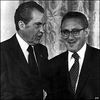Iraq: instead of benchmarks to get out, benchmarks to stay in
Posted by Suzanne Nossel
Instead of benchmarks to get the US out of Iraq, how about benchmarks to determine whether we stay in?
Here's the logic: the Administration persistently maintains that we're making great progress in Iraq. The American people have grave and growing doubts. If, as the daily news would lead one to believe, Iraq is spiraling closer to civil war, then our presence is at best a finger in the dyke. We hold on as long as we can to delay collapse, but meanwhile lose lives and deplete our military, when its just a matter of time before we pull away and the country disintegrates (with, if Bush is lucky, a decent interval in-between).
To decide whether we're better off leaving now, or waiting until some unknown future point when Iraq can stand on its two feet, we need to verify the credibility of the Administration's claim that it is making progress. Condi Rice outlined the Administration's strategy for Iraq a few weeks ago as "clear, hold, build." So how about the Congress giving the Administration 10 weeks, until the end of January, 2006 to demonstrate the following:
- Getting the number of Iraqi military battalions capable of fighting independently of the US up from 1 to 5;
- Per Rice's strategy, identify up front 5 secure areas formerly occupied by insurgents and ensure that, safeguarded by Iraqi rather than US forces (but with American advisers if needed) they stay secure (i.e. no IEDs, no suicide attacks) over the coming 10 weeks;
- Secure commitments of 5000 additional (truly new) foreign troops to be deployed to Iraq in support of the US-led operation (note that the Koreans, within a day of Bush's meeting with Roh, have just announced they're pulling out a third of their troops).
The Government Accountability Office can certify whether these benchmarks are met.
You could argue that these requirements aren't rigorous enough but I would frankly be impressed if the Administration could accomplish all 3 by late January. Coupled with a successful election in December, it might help rebuild confidence in the mission.
If these benchmarks are met, would that not mean that we could start withdrawing US troops, rather than deciding to leave them in? Rest assured: if we ever start seeing solid evidence that Iraq is capable of securing itself and holding its own politically, there won't be a politician or a wonk in America who doesn't favor starting to pull out.
There's no disagreement between Republicans and Democrats when it comes to getting out if sufficient political and military progress can be made. We disagree about whether to stay in given the manifest absence of progress. So let's create some concrete benchmarks that allow us to evaluate whether "mission accomplished" is actually accomplishing anything at this point.










